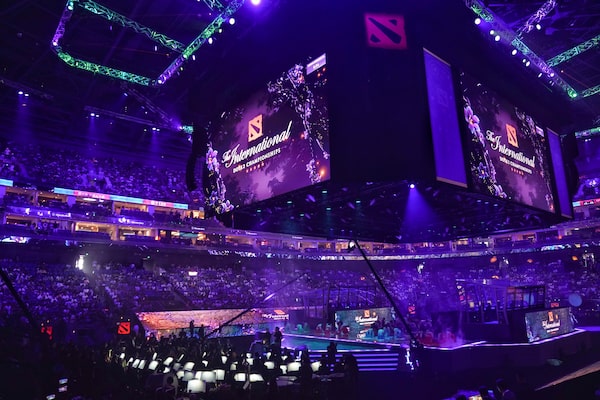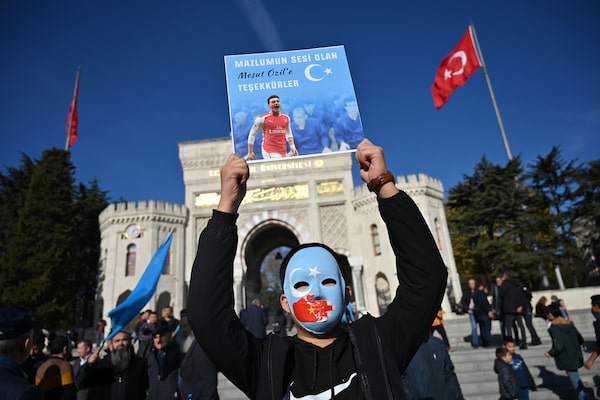Players compete in League of Legends inside a luxury villa used by Topsports, an e-sports club in Shanghai.Nathan VanderKlippe/The Globe and Mail
For 20 frenzied minutes, five young men sit side by side, staring at screens where colourful characters duel in flashes of weapons fire and bursts of flame.
“If you told me earlier you didn’t get him, I would have kept my best weapon for the last minute,” a voice calls out from the row of players, seated inside a marbled luxury villa that serves as their digital training ground.
“You’ve lost some blood,” a voice calls out. “I’m dead,” another responds.
It’s a sound sought by governments and well-heeled investors alike in Shanghai, a city at the forefront of China’s bid to grasp power and profit in a digital gaming world that, the industry estimates, generates more global revenue than movies and music combined.
Stadiums, professional leagues, million-dollar salaries, broadcasting and training facilities are all part of an ambitious Chinese strategy to profit from a fast-growing industry – but also to assert Chinese influence on an important, youth-dominated segment of the entertainment universe.
Topsports has three villas on Shanghai's outskirts, but it's only temporary. A six-storey facility is being built for them.
Topsports club manager Luo Shou keeps tabs on a practice game in progress.Nathan VanderKlippe/The Globe and Mail
When the game ends, the young men gather in a half-circle around a large monitor, where Luo Shou, their manager at the Topsports club, shuttles through a replay of the League of Legends battle they’ve just completed. He is not pleased. The team has deviated from the strategy he had set out.
The players, who rarely leave this elevator-equipped luxury villa – sleeping on the third floor, training daily on the ground level, eating regional delicacies prepared by a dedicated nanny – defend themselves. One says he felt like giving up because the opponents “were so severe and cruel.” Mr. Luo ends with a few words of praise.
Then, they swing back to their computers, beneath the writing on the wall that says, in English: “Set the goal of training the place where will never reach, sometimes you will feel tired, hesitate, even depressed, but don’t give up, because victory is not a miracle.”
It’s an exhortation to achieve that could as well describe the ambitions of Shanghai, a port city that has itself been in search of greatness — not just in League of Legends, but in the broader e-sports industry of professionals playing and broadcasting.
The city wants to become what Zhu Qinqin, deputy director of the Shanghai E-Sports Association, calls “the e-sports centre of the universe.”

An Aug. 20 opening ceremony kicks of the International Dota 2 Championships in Shanghai, where a record US$33.5-million was at stake for players of the battle-arena game Dota 2.STR/STR/AFP via Getty Images
The dense coastal city, with some of the most expensive real estate in China, has devoted a six-square-kilometre commercial area to the industry. It created an official identity certificate to register e-sports athletes inside its borders.
It has also succeeded in attracting major tournaments to the city, including the 2020 League of Legends World Championship, and eye-popping investment, with gaming company NetEase pledging to spend $945-million to build what it calls “China’s first large professional e-sports stadium.”
“From the perspective of policy and government, Shanghai’s e-sports development plan must be the biggest in the world,” Mr. Zhu said.
In part, it’s a bid to latch onto growth. Where other industries have stagnated in China, e-sports revenues are rising at greater than 20 per cent a year, he said. “We can see the potential here,” he said.
But it’s also part of a wider Chinese effort to assert influence in an entertainment market with global reach, making e-sports perhaps the most robust soft power venture in modern Chinese history.
While the country’s investors and artists have an uneven track record in penetrating Hollywood, and Chinese musicians struggle outside their home borders, China has made much deeper inroads in digital gaming, bolstered by the size of the market at home.
A sign for the tech giant Tencent is seen at this fall's World Internet Conference in Wuzhen, China.Aly Song/Reuters/Reuters
The world’s largest video game company is Chinese tech giant Tencent, which owns Riot Games (creator of League of Legends), has a 40-per-cent stake in Epic Games (the company behind Fortnite), and has smaller stakes in Bluehole, Ubisoft and Activision Blizzard.
For Chinese authorities, foreign “soccer, American superstar movies, Japanese cartoons – they are a cultural infection,” said Hongyu Chen, a British-educated writer who follows the industry.
E-sports, however, have offered a way “to use culture as a weapon.”
At home, Mr. Chen said, e-sports “can unite people” – particularly youth – around the national flag, as they cheer on domestic teams that are increasingly successful. Abroad, e-sports can be used to inculcate elements of Chinese culture and enforce official dictates on foreign soil.
Earlier this year, for example, participants in Blizzard games raised controversy when they openly supported protesters in Hong Kong. Blizzard, in response, suspended several people.
In December, NetEase removed Mesut Ozil from its Pro Evolution Soccer 2020 game in China after the midfielder for the Arsenal Football Club in London spoke in defence of Muslim Uyghurs incarcerated in China. NetEase opened a Canadian production centre in Montreal this July.

A supporter of China's Uyghur minority holds a placard of Arsenal midfielder Mesut Ozil reading 'Thanks for being our voice' at an Istanbul on Dec. 14. Mr. Ozil was removed from a soccer video game after criticizing Beijing's treatment of the Uyghurs.OZAN KOSE/Ozan Koze/AFP/Getty Images
Chinese gaming executives openly acknowledge objectives that go beyond profit. “This is how we want to pass on our cultural heritage to the younger generation and make them love the ancient culture,” Colin Yao, who leads TiMi Studios at Tencent, told Fortune, as he described the company’s Honor of Kings, the highest-grossing mobile game last year.
That game has also illustrated the difficulty in exporting Chinese values: An overseas adaptation called Arena of Valor has not been a runaway hit.
But China’s pursuit of supremacy in e-sports is proceeding undimmed. Some 40 universities now offer e-sports courses. Companies such as Shanghai-based ImbaTV have rapidly build up entirely new lines of business, including an e-sports hotel and an e-sports experience in a local shopping mall, in addition to competitions the company organizes.
Top e-sports hosts and commentators can earn nearly $2-million a year, ImbaTV co-founder Zhou Lingxiang says. Live events in second- and third-tier cities sell out in minutes.
Topsports team manager Guo Hao sits by one of the villas the club occupies.Nathan Vanderklippe/Nathan VanderKlippe/The Globe and Mail
Top players, meanwhile, are signing contracts worth nearly $10-million – and at least 10 of the 16 clubs in the country’s League of Legends Pro League “can afford a price like that,” said Guo Hao, the team’s manager.
The Topsports club occupies three villas in a luxury development on the outskirts of Shanghai – temporary accommodations, until construction is completed on a purpose-built, six-storey facility, complete with space for “game training, physical exercise, eating and sleeping,” Mr. Guo said. In total, it will measure more than 32,000 square feet.
Budgets are big. In the club’s first year, it spent more than $28-million, money that is building both expertise and hopes.
“My goal in life is very clear and very simple,” says Bai Jiahao, a member of Topsports’ core elite group. “I want to be the world champion. Not just in China, but the world.”
Topsports player Bai Jiahao plays a practice round of League of Legends.Nathan Vanderklippe/Nathan VanderKlippe/The Globe and Mail
With reports from Alexandra Li
 Nathan VanderKlippe
Nathan VanderKlippe